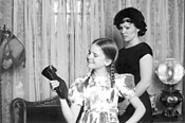Painstakingly brought back to life by Ensemble Theatre, it now works on a different level. Instead of horror, it offers the peculiar fun of rummaging through a secondhand shop. Its historical value is clear: It was among the first works to dare impeach the sacred innocence of childhood.
William March, who wrote the novel it was based on, was one of the countless repressed homosexuals who made up the New York literati of the 1950s. In what would be his last and most successful novel, he managed to combine his hostility toward children with a penchant for the perversely violent and an obsession with evil passed through the female line. He exposed the possibility of prepubescent coyness as a mask for malice, thus pioneering the concept of pop literature's first satanic tot.
Nearing the end of his career, noted playwright Maxwell Anderson decided as a lark to adapt March's novel to the stage, cheerfully confessing it a potboiler. Rhoda, the play's "Bad Seed," is a girl of eight; before the curtain rises, she has fatally tripped an old lady down a flight of stairs for possession of a paperweight. In the play's two hours, she manages (offstage) to pummel a little boy with one of her Mary Janes before drowning him in the lake. She then incinerates the local handyman when he threatens to expose her misdeeds. This monstrous heroine does her killing with the same effortless aplomb with which she performs her little curtsies. Her trademark is to offer a "basket of hugs" in exchange for a "basket of kisses."
The little girl's evilness is attributed to heredity. Her mother, gradually realizing that her own mother was a notorious murderess, tries to stop the family curse by attempting to do away with her daughter. All this mayhem fascinated '50s theatergoers in much the same way that The Exorcist would later deliriously creep-out '70s moviegoers.
Playwright Anderson was known for his dexterity with words (he wrote the lyrics to the sublime "September Song"), but in this case, the dialogue reeks of the musty lachrymose clichés of old-time radio serials. Yet the work's special cachet is that it renders evil with the down-home familiarity of a Duncan Hines cake mix.
Director Fred Sternfeld bravely resists the obvious temptation to goose this quaint relic with fey overstatement. He works with integrity: playing it straight, honoring every creaky convention, and staying true to its careful, deliberate pace, which is anathema to the short attention spans of modern audiences. He delivers up a compelling time capsule, exemplified by the doilies on the sofa and the Reader's Digests in the bookshelves. The evening abounds in '50s ambiance.
At 13, Betsy Hogg looks too mature to play the treacherous Rhoda (not that an actual eight-year-old could play this role). She acts with a frightening, iron determination, making deliberate winsomeness horrific. We can envision her leading the Junior Miss division of the Hitler Youth Movement.
Bold, well-etched performances are the general standard here. As the troubled mother, Christine, Cassandra Vincent commences with the perfectly coiffured placidity of one of those TV housewives perpetually hawking home appliances and ultimately ends with the tragic nobility of Oedipus's Jocasta going to her doom. Mary Faktor has two poignant scenes as the desperate, alcoholic mother of the drowned schoolboy. She makes her whiskey-drenched, halting agony painfully tangible throughout the theater. Catherine Albers brings a Tennessee Williams tang to the garrulous landlady, who luxuriously envelops all in her madcap psychobabble. Charles Kartali, as the fatally mischievous handyman with an uncanny insight into evil, offers a dose of trailer-park sexuality. Jean C. Colerider flits about like a timid butterfly, effectively recalling the skittishness of long-ago schoolmarms.
The play is given a strange verisimilitude by off-kilter but evocative Southern accents. Calvin Knight's sepia walls and Amy Matt's costumes, redolent of a 1950s Sears & Roebuck catalog, give it the look of vanished small-town American life. Yet, lighting that is meant to appear ominous often seems ludicrous instead.
A story once intended to evoke shivers and withering irony now seems contrived, though paradoxically innocent. Yesterday's nightmares are today's nostalgic reveries: Such are the ravages of time.


